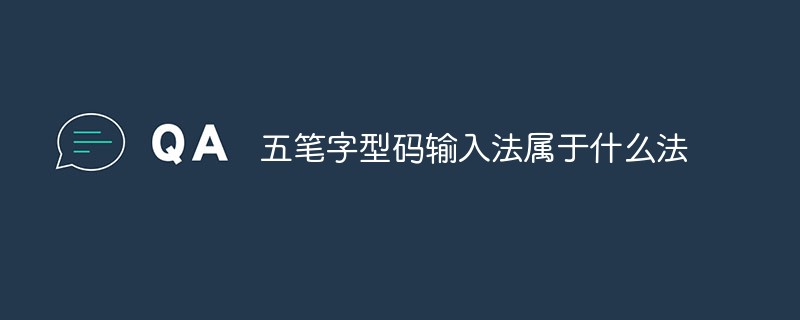Home >Common Problem >What method does the Wubi font code input method belong to?
What method does the Wubi font code input method belong to?
- 藏色散人Original
- 2021-01-11 14:09:3158025browse
The Wubi font input method belongs to the graphical code input method; the Wubi font input method is a Chinese character input method invented by Wang Yongmin in August 1983; because the inventor's surname is Wang, it is also called "Wang" "Code Wubi"; Wubi font encodes Chinese characters completely based on stroke and glyph characteristics, which is a typical font code input method.

#The operating environment of this article: Windows 7 system, Dell G3 computer.
The Wubi font input method belongs to the shape code input method.
The Wubi input method (abbreviated as Wubi) is a Chinese character input method invented by Wang Yongmin in August 1983. Because the inventor's surname was Wang, it was also called "Wangma Wubi". Wubi font encodes Chinese characters completely based on stroke and glyph characteristics, and is a typical font code input method.
Wubi is currently one of the most commonly used Chinese character input methods in China and some Southeast Asian countries such as Singapore and Malaysia. Compared with Pinyin input method, Wubi has the characteristics of lower code repetition rate. Once you are proficient, you can input Chinese characters quickly. Since the birth of the Wubi font in 1983, three versions have been launched: 86 Wubi, 98 Wubi and New Century Wubi.
At the end of the 20th century, intelligent pinyin became popular, and the number of people using Wubi dropped sharply.
Related introduction:
Input method refers to the encoding method used to input various symbols into computers or other devices (such as mobile phones). Basically divided into two categories: 1. Based on the meaning of the characters, input is fast and accurate, but requires special learning; 2. Based on the pronunciation of the characters, the accuracy is not high (the built-in dictionary has little impact on popular words and idioms) ), but currently all keyboards have pinyin letters printed on them, so there is no need to specialize in inputting commonly used words.
It should be noted that the input method refers to the input encoding method rather than the software that implements text input. For example, the widely used Hanyu Pinyin scheme and Wubi font in Chinese input methods, as well as the widely used Cangjie encoding and phonetic symbols in Taiwan, can be used as encoding methods for Chinese character input methods, thus forming a Pinyin input method or a Zhuyin input method that can input Chinese characters. In addition, the five-stroke input method, the two-stroke input method, the natural code input method, the Zheng code input method, the stroke input method, the Xiami input method and the Cangjie input method all belong to Chinese character encoding methods. Only when the Chinese character input method code is installed on the input method software can Chinese characters be typed on a computer or mobile phone. The elderly specially learn the typing input method "Huibang Five Elements Code" [1], which completely solves the problem of typing without pinyin or root characters. Problems with accessing the Internet [1] . The input method is a writing tool with unlimited ink. It is the product of the development of writing productivity to a certain stage. From a philosophical point of view, it is the inevitable result of the quantitative change in writing production that leads to the qualitative change of writing tools (writing tools).
For more related knowledge, please visit PHP Chinese website!
The above is the detailed content of What method does the Wubi font code input method belong to?. For more information, please follow other related articles on the PHP Chinese website!
Related articles
See more- What to do if the input method cannot be switched in win7 system
- Why does the input method change to traditional Chinese characters?
- What should I do if the computer cannot press the input method?
- What to do if the input method is not displayed at the bottom of the desktop
- How to delete input method in win10

